英汉翻译方法1——被动语态译法
12.被动语态的译法

被动语态的译法
----英汉翻译技巧之七
the change of the voices(语态变换法)
Among the translation techniques, there exist one called “the change of the voices”. Actually, the passive voice is more commonly used in English than in Chinese, especially in the writing of science and technology. In the sentences in which the doers are not necessarily told or known, the passive voice is used. And sometimes for the sake of connection of the context, there occurs the passive voice. Since the passive structure seldom appears in Chinese, many passive sentences in English have to be turned into active sentences in Chinese. In fact, a translator tries to render the passive sentences into Chinese active sentences as many as possible. But the version must be made idiomatic and smooth, not ambiguous or abstruse. This is a problem which is worth our attention.
科技英语翻译--被动语态的译法 (1)
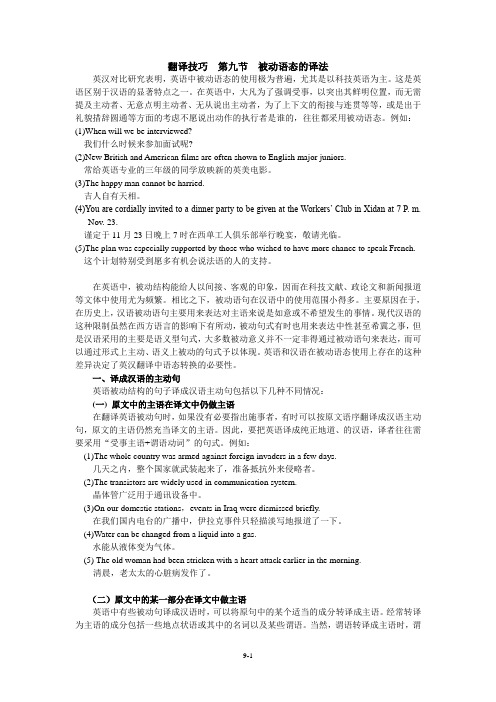
翻译技巧第九节被动语态的译法英汉对比研究表明,英语中被动语态的使用极为普遍,尤其是以科技英语为主。
这是英语区别于汉语的显著特点之一。
在英语中,大凡为了强调受事,以突出其鲜明位置,而无需提及主动者、无意点明主动者、无从说出主动者,为了上下文的衔接与连贯等等,或是出于礼貌措辞圆通等方面的考虑不愿说出动作的执行者是谁的,往往都采用被动语态。
例如:(1)When will we be interviewed?我们什么时候来参加面试呢?(2)New British and American films are often shown to English major juniors.常给英语专业的三年级的同学放映新的英美电影。
(3)The happy man cannot be harried.吉人自有天相。
(4)You are cordially invited to a dinner party to be given at the Workers’ Club in Xidan at 7 P. m.Nov. 23.谨定于11月23日晚上7时在西单工人俱乐部举行晚宴,敬请光临。
(5)The plan was especially supported by those who wished to have more chance to speak French. 这个计划特别受到愿多有机会说法语的人的支持。
在英语中,被动结构能给人以间接、客观的印象,因而在科技文献、政论文和新闻报道等文体中使用尤为频繁。
相比之下,被动语句在汉语中的使用范围小得多。
主要原因在于,在历史上,汉语被动语句主要用来表达对主语来说是如意或不希望发生的事情。
现代汉语的这种限制虽然在西方语言的影响下有所动,被动句式有时也用来表达中性甚至希冀之事,但是汉语采用的主要是语义型句式,大多数被动意义并不一定非得通过被动语句来表达,而可以通过形式上主动、语义上被动的句式予以体现。
英汉翻译要点归纳
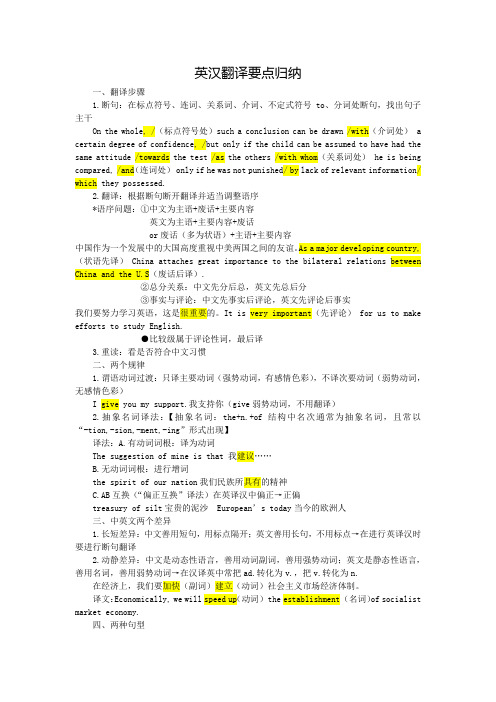
英汉翻译要点归纳一、翻译步骤1.断句:在标点符号、连词、关系词、介词、不定式符号to、分词处断句,找出句子主干On the whole, /(标点符号处)such a conclusion can be drawn /with(介词处) a certain degree of confidence, /but only if the child can be assumed to have had the same attitude /towards the test /as the others /with whom(关系词处) he is being compared, /and(连词处) only if he was not punished/ by lack of relevant information/ which they possessed.2.翻译:根据断句断开翻译并适当调整语序*语序问题:①中文为主语+废话+主要内容英文为主语+主要内容+废话or废话(多为状语)+主语+主要内容中国作为一个发展中的大国高度重视中美两国之间的友谊。
As a major developing country,(状语先译) China attaches great importance to the bilateral relations between China and the U.S(废话后译).②总分关系:中文先分后总,英文先总后分③事实与评论:中文先事实后评论,英文先评论后事实我们要努力学习英语,这是很重要的。
It is very important(先评论) for us to make efforts to study English.●比较级属于评论性词,最后译3.重读:看是否符合中文习惯二、两个规律1.谓语动词过渡:只译主要动词(强势动词,有感情色彩),不译次要动词(弱势动词,无感情色彩)I give you my support.我支持你(give弱势动词,不用翻译)2.抽象名词译法:【抽象名词:the+n.+of结构中名次通常为抽象名词,且常以“-tion,-sion,-ment,-ing”形式出现】译法:A.有动词词根:译为动词The suggestion of mine is that 我建议……B.无动词词根:进行增词the spirit of our nation我们民族所具有的精神C.AB互换(“偏正互换”译法)在英译汉中偏正→正偏treasury of silt宝贵的泥沙 European’s today当今的欧洲人三、中英文两个差异1.长短差异:中文善用短句,用标点隔开;英文善用长句,不用标点→在进行英译汉时要进行断句翻译2.动静差异:中文是动态性语言,善用动词副词,善用强势动词;英文是静态性语言,善用名词,善用弱势动词→在汉译英中常把ad.转化为v.,把v.转化为n.在经济上,我们要加快(副词)建立(动词)社会主义市场经济体制。
被动语态的译法

(一) 1.他气得说不出话来。 2.那人不可信。 3.但是,一个最主要的问题是,像目前这 样的大城市是否还要保存下去。 4.使用电子显微镜,能获得大得多的放大 倍数。
5.而且还研究出了做饭用的太阳灶。 6.过了一会儿,达成了一项协议。 7.应该教育儿童讲真话。 8.决不能把个人利益凌驾于国家利益之上。 9.必须使学生能在德智体三方面得到全面 发展。
例3.My first thirty years were spent in Western America. 我的前三十年是在美国西部度过的。 例4.The manuscript was sent to the printer in London a few weeks before the French Revolution. 手稿是在法国革命前几周寄往伦敦付印的。
例1.Yet, only a part of this energy is . used by man. 然而,人类只利用了这种能源的一部分。 然而,人类只利用了这种能源的一部分。 例2.He is revered and admired by all . of us. 我们大家都景仰他,钦佩他。 我们大家都景仰他,钦佩他。
一般说来,可译为无主句的英语被动 句多是描述什么地方发生、存在或消 失了什么事物的句子。另外,一些表 示看法、态度及告诫、要求、号召等 的句子,可译成汉语的使动结构。使 动结构的特点是:通常不提出施动者, 即为无主句;句中有“使”、“让” 等词。如:
例1.Every student must be helped to understand that only by painstaking study can he master English. 必须使每个学生懂得,只有刻苦学习,才能掌 握英语。 例2.The educational reform must be carried through to the end. 必须把教育改革进行到底。 例3.In no circumstances should erroneous statements be allowed to spread unchecked. 决不让错误言论自由泛滥。
常用英汉翻译技巧

常用英汉翻译技巧来源:英汉两种语言在句法、词汇、修辞等方面均存在着很大的差异,因此在进行英汉互译时必然会遇到很多困难,需要有一定的翻译技巧作指导。
常用的翻译技巧有增译法、省译法、转换法、拆句法、合并法、正译法、反译法、倒置法、包孕法、插入法、重组法和综合法等。
这些技巧不但可以运用于笔译之中,也可以运用于口译过程中,而且应该用得更加熟练,因为口译工作的特点决定了译员没有更多的时间进行思考。
1增译法:指根据英汉两种语言不同的思维方式、语言习惯和表达方式,在翻译时增添一些词、短句或句子,以便更准确地表达出原文所包含的意义。
这种方式多半用在汉译英里。
汉语无主句较多,而英语句子一般都要有主语,所以在翻译汉语无主句的时候,除了少数可用英语无主句、被动语态或"There be…" 结构来翻译以外,一般都要根据语境补出主语,使句子完整。
英汉两种语言在名词、代词、连词、介词和冠词的使用方法上也存在很大差别。
英语中代词使用频率较高,凡说到人的器官和归某人所有的或与某人有关的事物时,必须在前面加上物主代词。
因此,在汉译英时需要增补物主代词,而在英译汉时又需要根据情况适当地删减。
英语词与词、词组与词组以及句子与句子的逻辑关系一般用连词来表示,而汉语则往往通过上下文和语序来表示这种关系。
因此,在汉译英时常常需要增补连词。
英语句子离不开介词和冠词。
另外,在汉译英时还要注意增补一些原文中暗含而没有明言的词语和一些概括性、注释性的词语,以确保译文意思的完整。
总之,通过增译,一是保证译文语法结构的完整,二是保证译文意思的明确。
如:(1)What about calling him right away?马上给他打个电话,你觉得如何?(增译主语和谓语)(2)If only I could see the realization of the four modernizations.要是我能看到四个现代化实现该有多好啊!(增译主句)(3) Indeed, the reverse is true实际情况恰好相反。
翻译技巧讲解 1

Translation TechniquesThe Passive Voice (1)被动语态Ⅰ. The Passive Voice in English-Chinese Translation英汉翻译中的被动语态广泛使用被动句型是英语的一大特点。
英语中的被动句型远远多于汉语。
由于被动句型的感情色彩少于主动句型,凡是不需要或者不方便以及无从说出动作的执行者,或是为了上下文的连贯以及使句子得到更好的安排时,英语都会采用被动句型。
科技文献中为了避免主观上的臆断,被动句型用得更为普遍。
在汉语中,也有被动句,通常通过“被”或“把”等词体现出来,但其使用范围远远小于英语中被动语态的使用范围。
由于汉语拥有英语中所没有的无主句,因此英语中的被动句型可以译成汉语的主动句,也可以把它译成汉语的被动句,而且译法灵活多样。
常见的译法主要有以下几种:1. Conversion of the Passive Voice into the Active Voice译成汉语主动句英语中被动结构的句子译成汉语主动句可以有几种不同情况:1)原文中的主语在译文中仍作主语例1:This week, scientists of the Anthropological Survey of India told the Herald Sun of Melbourne, Australia, that members of the ancient tribes it visited on the Andaman andNicobar I slands near the earthquake’s epicenter may have been spared because theynoticed unusual behavioral changes in the birds, dolphins and lizards. (Unit 1 A)本周,印度人类学研究所的科学家们向澳大利亚墨尔本的《先驱太阳报》透露,该研究所曾走访过位于震中附近的安达曼-尼科巴群岛上的原始部落居民,他们很可能是因为注意到了鸟类、海豚和蜥蜴的反常行为而得以幸免于难。
英汉翻译要点整理
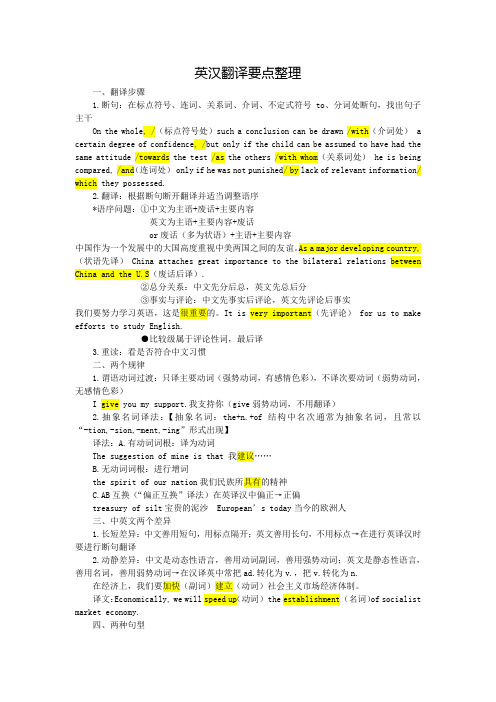
英汉翻译要点整理一、翻译步骤1.断句:在标点符号、连词、关系词、介词、不定式符号to、分词处断句,找出句子主干On the whole, /(标点符号处)such a conclusion can be drawn /with(介词处) a certain degree of confidence, /but only if the child can be assumed to have had the same attitude /towards the test /as the others /with whom(关系词处) he is being compared, /and(连词处) only if he was not punished/ by lack of relevant information/ which they possessed.2.翻译:根据断句断开翻译并适当调整语序*语序问题:①中文为主语+废话+主要内容英文为主语+主要内容+废话or废话(多为状语)+主语+主要内容中国作为一个发展中的大国高度重视中美两国之间的友谊。
As a major developing country,(状语先译) China attaches great importance to the bilateral relations between China and the U.S(废话后译).②总分关系:中文先分后总,英文先总后分③事实与评论:中文先事实后评论,英文先评论后事实我们要努力学习英语,这是很重要的。
It is very important(先评论) for us to make efforts to study English.●比较级属于评论性词,最后译3.重读:看是否符合中文习惯二、两个规律1.谓语动词过渡:只译主要动词(强势动词,有感情色彩),不译次要动词(弱势动词,无感情色彩)I give you my support.我支持你(give弱势动词,不用翻译)2.抽象名词译法:【抽象名词:the+n.+of结构中名次通常为抽象名词,且常以“-tion,-sion,-ment,-ing”形式出现】译法:A.有动词词根:译为动词The suggestion of mine is that 我建议……B.无动词词根:进行增词the spirit of our nation我们民族所具有的精神C.AB互换(“偏正互换”译法)在英译汉中偏正→正偏treasury of silt宝贵的泥沙 European’s today当今的欧洲人三、中英文两个差异1.长短差异:中文善用短句,用标点隔开;英文善用长句,不用标点→在进行英译汉时要进行断句翻译2.动静差异:中文是动态性语言,善用动词副词,善用强势动词;英文是静态性语言,善用名词,善用弱势动词→在汉译英中常把ad.转化为v.,把v.转化为n.在经济上,我们要加快(副词)建立(动词)社会主义市场经济体制。
转态译法
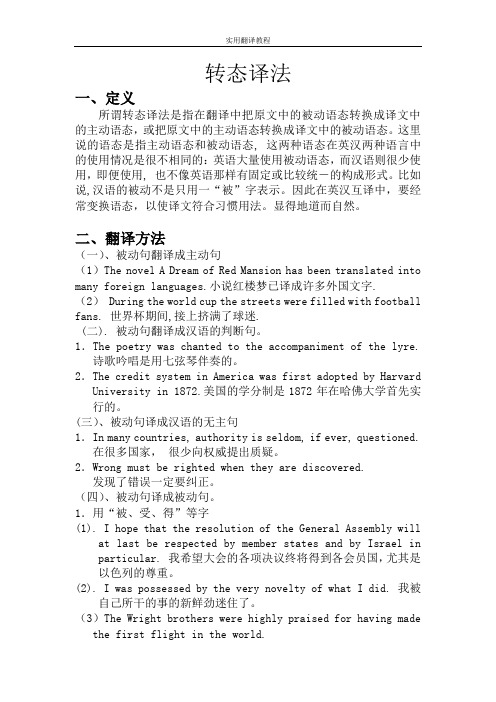
转态译法一、定义所谓转态译法是指在翻译中把原文中的被动语态转换成译文中的主动语态,或把原文中的主动语态转换成译文中的被动语态。
这里说的语态是指主动语态和被动语态, 这两种语态在英汉两种语言中的使用情况是很不相同的:英语大量使用被动语态,而汉语则很少使用,即便使用, 也不像英语那样有固定或比较统-的构成形式。
比如说,汉语的被动不是只用一“被”字表示。
因此在英汉互译中,要经常变换语态,以使译文符合习惯用法。
显得地道而自然。
二、翻译方法(一)、被动句翻译成主动句(1)The novel A Dream of Red Mansion has been translated into many foreign languages.小说红楼梦已译成许多外国文字.(2) During the world cup the streets were filled with football fans. 世界杯期间,接上挤满了球迷.(二). 被动句翻译成汉语的判断句。
1.The poetry was chanted to the accompaniment of the lyre.诗歌吟唱是用七弦琴伴奏的。
2.The credit system in America was first adopted by Harvard University in 1872.美国的学分制是1872年在哈佛大学首先实行的。
(三)、被动句译成汉语的无主句1.In many countries, authority is seldom, if ever, questioned.在很多国家,很少向权威提出质疑。
2.Wrong must be righted when they are discovered.发现了错误一定要纠正。
(四)、被动句译成被动句。
1.用“被、受、得”等字(1). I hope that the resolution of the General Assembly willat last be respected by member states and by Israel in particular. 我希望大会的各项决议终将得到各会员国,尤其是以色列的尊重。
汉英翻译2-句子的翻译
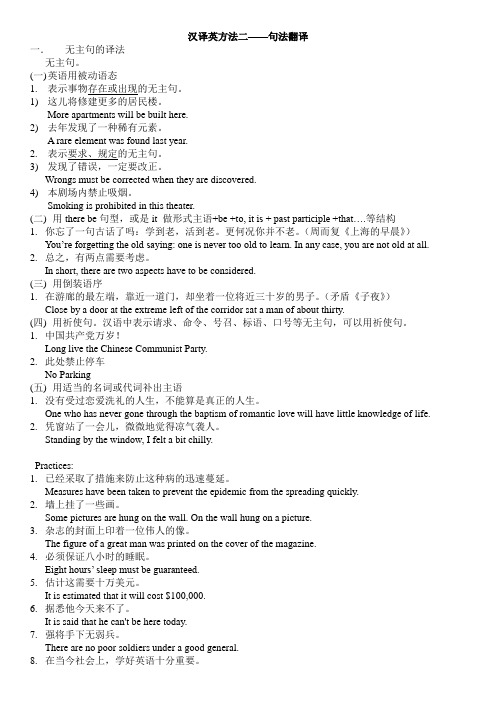
汉译英方法二——句法翻译一.无主句的译法无主句。
(一)英语用被动语态1.表示事物存在或出现的无主句。
1)这儿将修建更多的居民楼。
More apartments will be built here.2)去年发现了一种稀有元素。
A rare element was found last year.2.表示要求、规定的无主句。
3)发现了错误,一定要改正。
Wrongs must be corrected when they are discovered.4)本剧场内禁止吸烟。
Smoking is prohibited in this theater.(二)用there be句型,或是it 做形式主语+be +to, it is + past participle +that….等结构1.你忘了一句古话了吗:学到老,活到老。
更何况你并不老。
(周而复《上海的早晨》)You’re forgetting the old saying: one is never too old to learn. In any case, you are not old at all.2.总之,有两点需要考虑。
In short, there are two aspects have to be considered.(三)用倒装语序1.在游廊的最左端,靠近一道门,却坐着一位将近三十岁的男子。
(矛盾《子夜》)Close by a door at the extreme left of the corridor sat a man of about thirty.(四)用祈使句。
汉语中表示请求、命令、号召、标语、口号等无主句,可以用祈使句。
1.中国共产党万岁!Long live the Chinese Communist Party.2.此处禁止停车No Parking(五)用适当的名词或代词补出主语1.没有受过恋爱洗礼的人生,不能算是真正的人生。
课程资料:被动语态及从句的翻译

1. Translation of Passive V oice被动语态的翻译合同英语中被动语态的使用比较广泛。
凡是在不必说出合同所涉及的当事人的场合,或为了突出和强调行为动作的承受者以及便于行文上的连贯等原因,往往使用被动语态。
合同英语中被动语态所表达的概念,译成汉语时大多采用主动语态表示。
但在具体翻译的处理上,应采用较灵活的翻译技巧,做到在内容上忠实于原文,在语言形式上规范通顺。
以下就被动语态的翻译方法分述如下:1. Transforming the Passive V oice被动语态的转换翻译在进行合同文件的英汉翻译时,为使译文成为规范的汉语,一般应对原句中某一成分进行转换。
运用转换法翻译被动语态时,应注意以下几点:(1)把动作的发出者转换为主语:在合同英语中的一些被动句子中,往往出现由by或between 引起的短语,在句中作状语,其中名词是本句涉及的行为当事人,为突出句中动作的发出者,可将它转换为主语。
例如:①If any terms and conditions to this Contract are breached and the breach is not corrected by any party within 15 days after a written notice thereof is given by the other party, then the no breaching party shall have the option 10 terminate this Contract by giving written notice thereof to the breaching party.如果一方违背本合同的任何条款,并且在另一方发出书面通知后15日内不予以补救,未违约方有权选择向违约方书面通知终止本合同。
②This Contract is made by and between the Buyer and the Seller, whereby the Buyer agrees to buy and the Seller agrees to sell the under-mentioned commodity according to the terms and conditions stipulated below.买卖双方同意按下列条款购买、出售下述商品,并签订本合同。
翻译的基本技巧--被动语态的翻译.
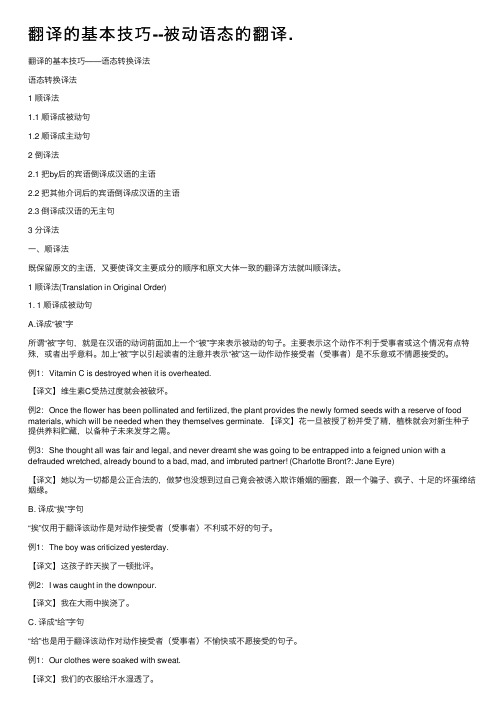
翻译的基本技巧--被动语态的翻译.翻译的基本技巧——语态转换译法语态转换译法1 顺译法1.1 顺译成被动句1.2 顺译成主动句2 倒译法2.1 把by后的宾语倒译成汉语的主语2.2 把其他介词后的宾语倒译成汉语的主语2.3 倒译成汉语的⽆主句3 分译法⼀、顺译法既保留原⽂的主语,⼜要使译⽂主要成分的顺序和原⽂⼤体⼀致的翻译⽅法就叫顺译法。
1 顺译法(Translation in Original Order)1. 1 顺译成被动句A.译成“被”字所谓“被”字句,就是在汉语的动词前⾯加上⼀个“被”字来表⽰被动的句⼦。
主要表⽰这个动作不利于受事者或这个情况有点特殊,或者出乎意料。
加上“被”字以引起读者的注意并表⽰“被”这⼀动作动作接受者(受事者)是不乐意或不情愿接受的。
例1:Vitamin C is destroyed when it is overheated.【译⽂】维⽣素C受热过度就会被破坏。
例2:Once the flower has been pollinated and fertilized, the plant provides the newly formed seeds with a reserve of food materials, which will be needed when they themselves germinate. 【译⽂】花⼀旦被授了粉并受了精,植株就会对新⽣种⼦提供养料贮藏,以备种⼦未来发芽之需。
例3:She thought all was fair and legal, and never dreamt she was going to be entrapped into a feigned union with a defrauded wretched, already bound to a bad, mad, and imbruted partner! (Charlotte Bront?: Jane Eyre)【译⽂】她以为⼀切都是公正合法的,做梦也没想到过⾃⼰竟会被诱⼊欺诈婚姻的圈套,跟⼀个骗⼦、疯⼦、⼗⾜的坏蛋缔结姻缘。
英语翻译1被动语态的翻译

被动语态的翻译
1.2 译成主动句
英译汉时,不少英语被动句被译成汉语主动句,使句
子更符合汉语习惯。 Don’t be alarmed if your newborn fails to be startled by loud noises or fails to turn toward sound. 如果你的新生儿听到响声并不吃惊,或者没有把头转 向发出声音的方向,不必慌张。
Late in November, street lights and store windows are decorated with the traditional Christmas colors of red and green. 11月下旬,街灯和商店的橱窗都用红和绿这两种传统的 圣诞节颜色加以装饰。
10
被动语态的翻译
2.2 含有被动意义的汉语句子应当译成英语的被动句 这类句子在形式上没有被动标记:有主语有动词,但主语 不是谓语动词动作的执行者,有时主语缺席,但都有被动含义, 英译时应该译成被动语态。例如: 当他了解到需要什么以后就决定申请入会。 When he learned what was required, he decided to apply for membership. 基本建设速度加快,投资环境不断完善。 The capital construction has been accelerated and the environment for investment has been continuously improved.
9
被动语态的翻译
二、 汉译英中被动语态的翻译
2.1 带有如 “被”、“受”、“遭”、“给”、“挨”等被动标 记词的汉语句子应该译成英语被动句。 1) 被采访的孩子们的反应是不同的。 Latchkey children who were interviewed reported diverse reactions. 2) 他们认为他们受到了关爱与信任,这种感觉激励了他们的信心。 They felt loved and trusted, and this feeling encouraged them to be self-confident. 3) 我发现昨天英语考试中我作弊的事当天晚上就让我父母知道了。 I found that my cheating in yesterday’s English test was known by my parents that very evening.
英汉翻译技巧
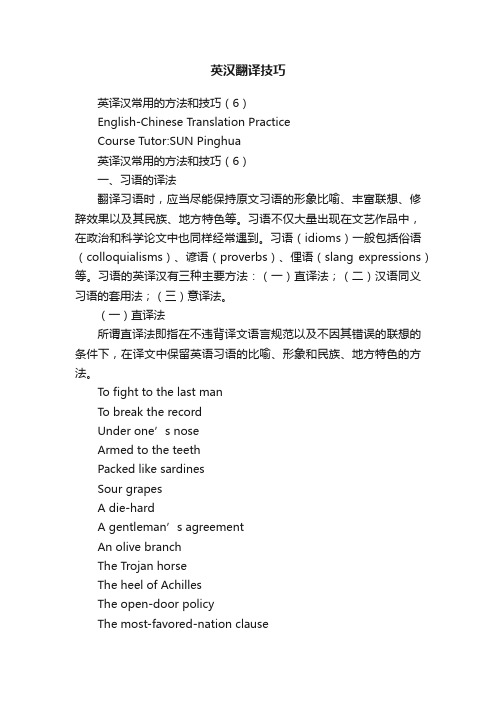
英汉翻译技巧英译汉常用的方法和技巧(6)English-Chinese Translation PracticeCourse Tutor:SUN Pinghua英译汉常用的方法和技巧(6)一、习语的译法翻译习语时,应当尽能保持原文习语的形象比喻、丰富联想、修辞效果以及其民族、地方特色等。
习语不仅大量出现在文艺作品中,在政治和科学论文中也同样经常遇到。
习语(idioms)一般包括俗语(colloquialisms)、谚语(proverbs)、俚语(slang expressions)等。
习语的英译汉有三种主要方法:(一)直译法;(二)汉语同义习语的套用法;(三)意译法。
(一)直译法所谓直译法即指在不违背译文语言规范以及不因其错误的联想的条件下,在译文中保留英语习语的比喻、形象和民族、地方特色的方法。
To fight to the last manTo break the recordUnder one’s noseArmed to the teethPacked like sardinesSour grapesA die-hardA gentleman’s agreementAn olive branchThe Trojan horseThe heel of AchillesThe open-door policyThe most-favored-nation clauseThe position-of-strength policyShuttle diplomacyThe cold warA cat has nine livesBlood is thicker than waterBarking dogs do not biteA rolling stone gathers no moss战斗到最后一个人打破记录在某人鼻子底下武装到牙齿挤得象罐头沙丁鱼酸葡萄死硬派君子协定橄榄树枝特洛伊木马阿基里斯的脚踵悬挂在达摩克里斯头顶上的剑门户开放政策最惠国条款实力地位政策穿梭外交冷战热战猫有九命血浓于水吠犬不咬人滚石不生苔(二)汉语同义习语的套用法有的英语习语和汉语同义习语在内容和形式上都相符合,双方不但有相同的意义和修辞色彩,并且有相同的或大体相同的形象比喻。
被动句的译法1

”字句:例:
一)译成被动句:
4)译成“遭/受/挨/给/为…所”字句:例 : To prevent the Old Beijing from being destroyed, Mao Zedong was determined to liberate it peacefully.
为避免北京古城遭到破坏,毛泽东力主北
如:The book sells well. 这书卖得快。
The flower smells nice. 这种花闻着香。 A new building has been set up. 新楼(被)建起来了。
英语中那些用了被动语态的句
子在翻译成汉语时, 我们可以 根据汉语的语言习惯把被动语 态转换成主动语态; 汉语中用 主动语态的一些句子在翻译成 英语时, 我们也可以根据具体 情况把主动语态转换成被动语 态。就是所谓的转态译法/语态 转换法(the change of voices)。
Radio waves are also known as radiant energy. Heat is regarded as a form of energy.
无线电波也被认为是辐射能。
热被看作是能的一种形式。
一)译成被动句:
4) 由于现代汉语中被动句的使用范
围,受到外来语的影响而扩大,所以 有些表示愉快意思或中性意思的英语 被动句有时也可译成被动句。例: He was elected chairman. 他被选为主席。
一)译成被动句:
1)当英语被动句的意思是不愉快,有
所遭受,特别是在句中出现施动者, 就与汉语被动句的使用范围相吻合。 这时就译成汉语的被动句。句中用介 词或助词“被”、“叫”、“给”等 引进施动者,或用“为……所”来翻 译。例如:
英语写作翻译:被动语态如何翻译

以下是为⼤家整理的《英语写作翻译:被动语态如何翻译》的⽂章,供⼤家参考⼀、译成汉语主动句将英语被动语态译成汉语主动语态的⽅法⼀般包括以下⼏种:(⼀)保存原⽂主语当英语被动句中的主语为⽆⽣命的名词,⽽且句中不出现由by引导的⾏为主体时,翻译时往往将原句中的主语仍然译成主语。
The meeting is scheduled for April 6th.会议定于四⽉六⽇举⾏。
Water can be changed from a liquid into a solid.⽔能从液体变成固体。
When rust is formed, a chemical change has taken place.当锈形成的时候,就发⽣了化学变化。
(⼆)主宾颠倒英语中很多被动句⼦在表⽰⾏为主体的词前都加上by,翻译时可将这类by结构中的宾语译成主语,⽽将原来的主语译成宾语。
She was given a new pen by her father.她爸爸送给她⼀⽀新钢笔。
Heat and light can be given off by this chemical change.这种化学反应能放出热和光。
Only a small portion of solar energy is now being used by us.现在我们只能利⽤⼀⼩部分太阳能。
有时英语被动句中并未出现by结构,⽽只是代之以⼀个由介词短语构成的状语。
这时仍可采⽤主宾颠倒的译法,将介词短语中的名词或名词词组译成句⼦的主语。
Communication satellites have already been used for living transmission in our country.我国已将通讯卫星⽤于实况转播。
The numerical data concerned are provided in the next chapter.下⼀章提供了有关的数据资料。
英语被动语态的翻译
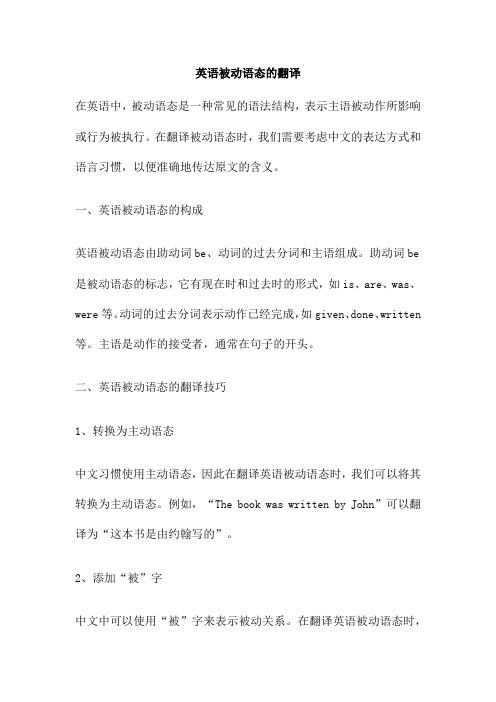
英语被动语态的翻译在英语中,被动语态是一种常见的语法结构,表示主语被动作所影响或行为被执行。
在翻译被动语态时,我们需要考虑中文的表达方式和语言习惯,以便准确地传达原文的含义。
一、英语被动语态的构成英语被动语态由助动词be、动词的过去分词和主语组成。
助动词be 是被动语态的标志,它有现在时和过去时的形式,如is、are、was、were等。
动词的过去分词表示动作已经完成,如given、done、written 等。
主语是动作的接受者,通常在句子的开头。
二、英语被动语态的翻译技巧1、转换为主动语态中文习惯使用主动语态,因此在翻译英语被动语态时,我们可以将其转换为主动语态。
例如,“The book was written by John”可以翻译为“这本书是由约翰写的”。
2、添加“被”字中文中可以使用“被”字来表示被动关系。
在翻译英语被动语态时,我们可以添加“被”字来明确动作的接受者。
例如,“The car was hit by a bus”可以翻译为“这辆车被公交车撞了”。
3、使用“受”、“遭”等词除了使用“被”字外,中文还可以使用“受”、“遭”等词来表示被动关系。
例如,“The city was attacked by the enemy”可以翻译为“这个城市遭到了敌人的攻击”。
4、省略“被”字在一些情况下,中文可以省略“被”字,直接将主语作为动作的接受者。
例如,“The house was cleaned”可以翻译为“房子被打扫了”。
翻译英语被动语态时,我们需要根据中文的语言习惯和表达方式进行适当的调整,以便准确地传达原文的含义。
考研英语中被动语态的翻译技巧引言在考研英语中,被动语态是考生必须掌握的一个重要语法结构。
由于中英文的语言习惯差异,被动语态的翻译成为了很多考生的难点。
本文将详细讲解考研英语中被动语态的用法和特点,并介绍相应的翻译技巧,帮助考生更好地应对翻译中的挑战。
知识点讲解被动语态是英语中常见的语法结构之一,通常用于强调动作的承受者。
变态译法
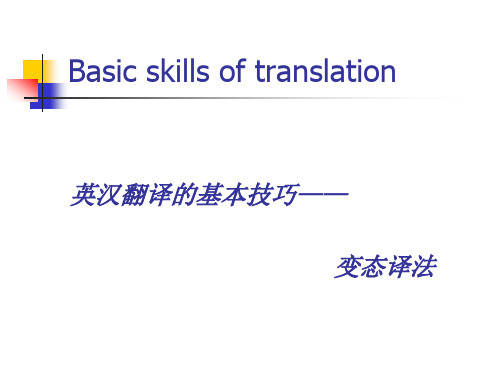
被动语态的翻译方法
特定句式的翻译(It is …..)这类以It作为形式主语的英语句子,在译文 中常要改成主动形式,有时不加主语,有时则加上不确定的主语,如 “有人”、“大家”、“人们”等,往往有固定的模式。
It is hoped that… It is reported that.. It is said that .. Its is supposed that…据推测 It may be said without fear of exaggeration that ..可以毫不夸张的说 It must be admitted that..必须承认 It must be pointed out that ..必须It is asserted that 有人主张 It is believed that 有人认为 It is generally considered that 人们普遍认为 It is well known that 众所周知
他总是赢钱,无怪乎那些眼红的人,赌输的人有时说 起这事便发
The invincible defense of Stalingrad is matched by the commanding military leadership of Stalin.
在斯大林格勒,不但有坚不可摧的防线,还有斯大林 英明的军事领导。
因此,当我们在这个伟大国家里受到这样隆重和盛情 的接待时,我认为中华人民共和国这样做是有重大意 义的。
翻译英语句子的要点

翻译英语句子的要点由于翻译部分的句型结构和阅读理解的较难句型基本类似,考试重点如出一辙,为了让大家更好的理解阅读理解真题文章,提高做题正确率,下面小编就跟你们详细介绍下翻译英语句子的要点,希望对你们有用。
翻译英语句子的要点如下:翻译英语句子的要点(一)被动语态翻译法1) 变为汉语的主动形式。
Eg:It leads the discussion to extremes at the outset: it invites you to think that animals should be treated either with the consideration humans extend to other humans, or with no consideration at all.这种说法从一开始就将讨论引向两个极端,它使人们认为应该这样对待动物:要么像对待人类自身一样关切体谅,要么完全冷漠无情。
2) 译成具有被动意义的汉语结构。
Eg:For all the help this computer may provide, it should not be seen as a substitute for fundamental thinking and reasoning skills.尽管计算机可以提供那么多的帮助,它却不应该被看作是基本的思维和推理技巧的替代物。
Eg:How well the predictions will be validated by later performance depends upon the amount, reliability, and appropriateness of the information used and on the skill and wisdom with which it is interpreted.这些预测将在多大程度上为后来的表现所证实取决于所用信息的数量、可靠程度、适宜程度以及用来解释这些信息的技巧与才智。
- 1、下载文档前请自行甄别文档内容的完整性,平台不提供额外的编辑、内容补充、找答案等附加服务。
- 2、"仅部分预览"的文档,不可在线预览部分如存在完整性等问题,可反馈申请退款(可完整预览的文档不适用该条件!)。
- 3、如文档侵犯您的权益,请联系客服反馈,我们会尽快为您处理(人工客服工作时间:9:00-18:30)。
被动语态的翻译教学内容⏹1、英语中常用被动语态的情况⏹Why passive voice is used in English?⏹2、汉语中被动意义的表现方式⏹How the sense of “passiveness” is conveyed in Chinese⏹3、英语被动语态的翻译Memo⏹Suppose a little boy broke someone’s window.⏹1. Your son broke my window.⏹2. The window was broken by your son.⏹Notes: If the owner of the house wants to complain to the boy’s parent, he would say “1”;⏹But if he just talks about the window and does not want to trace the responsibility of the incident he would simply say “2”.⏹When the crude oil is obtained from the field, it is taken to the refineries to be treated. The commonest form of treatment is heating. When the oil is heated, the first vapors to rise are cooled and become the finest petrol. Petrol has a low boiling point; if a little is poured into the hand, it soon vaporizes. Gas that comes off the oil later is condensed into paraffin. Last of all the lubricating oils of various grades are produced. What remains is heavy oil that is used as fuel.⏹When the crude oil is obtained from the field, it is taken to the refineries to be treated. The commonest form of treatment is heating. When the oil is heated, the first vapors to rise are cooled and become the finest petrol. Petrol has a low boiling point; if a little is poured into the hand, it soon vaporizes. Gas that comes off the oil later is condensed into paraffin. Last of all the lubricating oils of various grades are produced. What remains is heavy oil that is used as fuel.⏹一、被动语态在英语中的运用被动语态的广泛使用是英语区别于汉语的一大特点。
这一特点在科技英语语体中反映得尤为突出。
这不仅是因为被动结构比主动结构更少主观色彩,结构更简单,还因为有不必、不愿或无从说出施动者等情况的存在。
⏹1、不知道或没有必要说明动作的执行者是谁。
例如:Such books are written for children.We haven’t been told about it.The English evening has been put off till Saturday.⏹2、出于礼貌措辞等方面考虑不愿说出动作的执行者是谁。
例如:You are requested to give a performance.It is said that you were late for class this morning. Why were your late?⏹3、无从说出施动者是谁。
例如:You’re wanted on the phone.The problem is being studied.Rice is chiefly grown in the south.⏹4、为了便于上下衔接。
例如:He appeared on the stage and was warmly applauded by the audience.Jack fought John in the men’s singles last night and was beaten.幸亏一个渔夫救起了他。
“Fortunately, a fisherman picked him up.”“Fortunately, he was picked up by a fisherman.”⏹5、为了突出谈话的中心。
例如:The song was composed by a French musician.The program was designed by ourselves.⏹There is no grammar item of voice in Chinese, and the 被sentence is thought of as one of the special patterns. In many cases the sense of “passiveness” is often covet (unmarked) in Chinese, that is, the sense of the passive is implied in the active form. But they often have complements:⏹房子盖好了。
旧报纸卖了。
肉切厚了点儿。
练习做完了。
计划想出来了。
报告听完了。
二、汉语被动意义的表达方式◆用词汇的手段来表现被动意义例如:1、“为”字结构“茅屋为秋风所破”2、“被”字式——不幸语态“被捕”,“被剥削”,“被压迫”,“被杀”3、“让”、”给”、”叫”、“挨”、“受”、“遭”、“蒙”庄稼让大水冲跑了。
The crops were washed away by the flood.叫你猜对了You’ve guessed right.4、“是……的” 表示静态的句子这些产品是我国制造的。
5、“……的是”推荐我的是一位教授。
6、“……加以/予以”组成倒置的宾语结构这个问题将在下一章加以讨论。
◆用词序手段来表现被动意义1、受事者——动词困难克服了,工作完成了,问题也解决了。
2、受事着——施事者——动词我们在这里所讲的话,人们不会长久地记住。
三、翻译方法◆翻译成汉语的主动句1、“加以”,“经过”,“用……来”2、增补泛指性的词语(人们,大家等)作主语3、主语译成宾语4、翻译成汉语的无主句(zero-subject sentences)5、翻译成带“是……的”的主动句◆译成汉语的被动句1、汉语句中有“被”、“受”、“挨”、“遭受”等词2、译成“为……所”的结构◆译成“把”、“使”和“由”字句(causative structure使动结构)◆翻译成汉语的主动句◆“加以”,“经过”, “用……来” ,“可以用来”●Perfumes may be made from the oils of certain flowers. Soaps are made from vegetable and animal oils.有些花儿产生的油可以用来制造香水。
植物油和动物油还可以用来制作肥皂。
●Nuclear power's danger to health, safety, andeven life itself can be summed up in one word:radiation.2.增补泛指性的词语(人们,大家等)作主语It is generally accepted that the experiencesof the child in his first years largely determinehis character and later personality.It could be argued that the radio performs thisservice as well, but on television everything ismuch more living, much more real.⏹It is asserted that …有人主张……It is believed that …有人认为……It is generally considered that …大家(一般人)认为It is well known that …大家知道(众所周知)……It will be said …有人会说……It was told that …有人曾经说……It is announced that …据宣布说It is predicted that…据预测,有人预测It has been found that…已经发现3.主语译成宾语By the end of the war, 800 people had been saved by the organization, but at a cost of 200 Belgian and French lives.4.翻译成汉语的无主句Great efforts should be made to inform young peopleespecially the dreadful consequences of taking up the habit of smoking.New source of energy must be found, and this willtake time….5. 翻译成带“是……的”的主动句The decision to attack was not taken lightly.◆译成汉语的被动结构。
“被”,“给”, “遭”,“挨”,“为……所”,“使”,“由…”,“受到”等表示。
